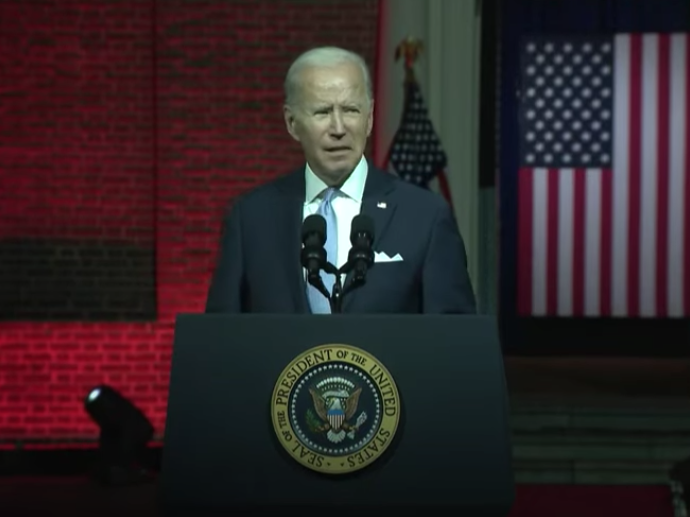Federalism provides it, or does it?
September 2, 2022

BY LEN CABRERA
Just when you thought the level of political rhetoric couldn’t get any more hyperbolic, U.S. President Joe Biden said Thursday night that his political opponents “[threaten] the very foundations of our republic.”
It seems the disparities between Republicans and Democrats are so great that they not only have distinct cultures but are distinct sub-species with different sensory organs – both sides can observe the same scenario and see completely different things. These disparities in perception lead each side to conclude the other is trying to destroy the country.
This tendency to believe that anyone on the other side is evil leads to vindictive name-calling, pithy “own the other side” memes, and self-righteous indignation that deems the opposition unworthy of debate. Rather than discussing policies or proper roles and levels of government, we attack people and affix the “-ist” or “-phobe” du jour.
Today the differences between the major political parties (at least among the politically active members) are so broad that no immediate remedy short of civil war seems possible. With the most extreme on both sides constantly painting their opponents as pure evil incarnate, it’s a wonder we haven’t had more lunatics trying to replicate the 2017 shooting at the Republican congressional baseball practice.
Fundamentally, the difference between conservatives/libertarians/Republicans and progressives/liberals/Democrats is the basic role of government. One side views government (especially at the national level) as a necessary evil to protect individual liberties, one that should be limited to specific functions. The other side views government as the proper tool to resolve all of society’s ills and ensure a basic quality of life for everyone (even non-citizens). Neither of these views is evil at its core, and you can make rational arguments for and against either one, but those arguments require conversation, not shouting mobs.
If you are concerned about how either Biden or Trump would be a threat to your way of life, you may want to consider the conservative view, which would greatly limit the impact of any one person in government.
The conservative view essentially summarizes the U.S. Constitution, which clearly defines the specific powers of the federal government and reserves everything else for the states. The Tenth Amendment states, “The powers not delegated to the United States by the Constitution, nor prohibited by it to the States, are reserved to the States respectively, or to the people.” This is the essence of federalism. The federal government controls those areas reserved to it, dealing mostly with international affairs and national security, and the states get to control the rest.
Federalism provides choice: If you want to live under an unobtrusive government that collects very little taxes, doesn’t provide public education or mass transit, allows open carry of grenade launchers, and generally leaves everyone to fend for themselves (like Texas on steroids), that would be totally fine for some states. On the other hand, if you prefer to live in a state with 90% tax rates, universal basic income, “free” healthcare, education, transportation, food, housing, etc.… maybe even Bernie Sanders as governor, you can have that, too. We could coexist (to borrow a phrase) in the same nation, with many different types of governments at the state level, as long as we agree to abide by the separation of powers and federalism spelled out in the Constitution.
More importantly, under such a system, the person occupying the White House would be nearly irrelevant to our daily lives. Most of the enumerated powers in the Constitution are listed in Article I, which pertains to Congress. The President’s powers are pretty much restricted to international diplomacy (making treaties, appointing ambassadors), appointing judges, and leading the military. You wouldn’t know about these limitations based on today’s headlines because Congress has ceded much of its power to the executive branch and its vast bureaucracy.
Sadly, over the last hundred years or so, the progressive movement has bent, changed, or flat-out ignored the Constitution so that the separation of powers and the limited role of the federal government barely exist. If judges simply interpreted the law rather than trying to rewrite it from the bench, people would be less concerned about who wears the black robes.
If you’re terrified of what “MAGA Republicans” would do if Trump or DeSantis became President in 2024 but you cheered the executive orders issued by Obama and Biden when they couldn’t get a desired bill through Congress, you may want to reconsider the powers the federal government has amassed for itself.
In his farewell address, George Washington warned against the “jealousies and heart-burnings” that result when parties “misrepresent the opinions and aims of other” parties: “It agitates the Community with ill-founded jealousies and false alarms; kindles the animosity of one part against another, foments occasionally riot and insurrection. It opens the door to foreign influence and corruption, which find a facilitated access to the government itself through the channels of party passions.”
It may be impossible to put the genie back in the bottle, but if we could return to federalism and limit the federal government to its specific enumerated powers, people would have less to fear from the President, regardless of the letter after his or her name.
